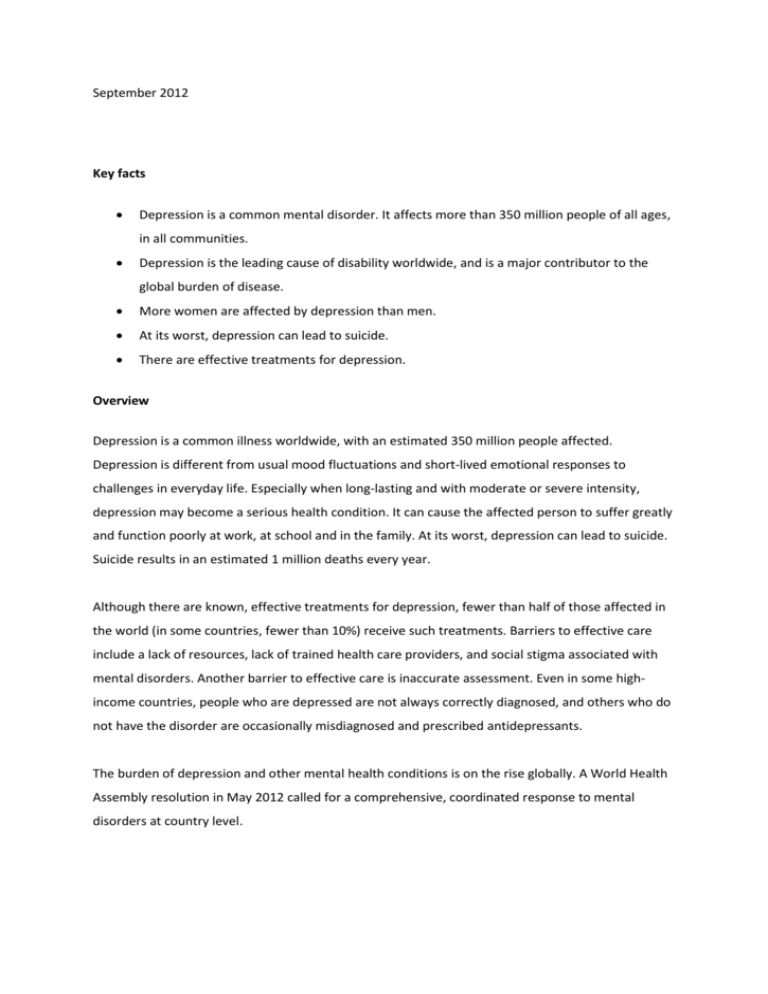September 2012 Key facts Depression is a common mental disorder
advertisement

September 2012 Key facts Depression is a common mental disorder. It affects more than 350 million people of all ages, in all communities. Depression is the leading cause of disability worldwide, and is a major contributor to the global burden of disease. More women are affected by depression than men. At its worst, depression can lead to suicide. There are effective treatments for depression. Overview Depression is a common illness worldwide, with an estimated 350 million people affected. Depression is different from usual mood fluctuations and short-lived emotional responses to challenges in everyday life. Especially when long-lasting and with moderate or severe intensity, depression may become a serious health condition. It can cause the affected person to suffer greatly and function poorly at work, at school and in the family. At its worst, depression can lead to suicide. Suicide results in an estimated 1 million deaths every year. Although there are known, effective treatments for depression, fewer than half of those affected in the world (in some countries, fewer than 10%) receive such treatments. Barriers to effective care include a lack of resources, lack of trained health care providers, and social stigma associated with mental disorders. Another barrier to effective care is inaccurate assessment. Even in some highincome countries, people who are depressed are not always correctly diagnosed, and others who do not have the disorder are occasionally misdiagnosed and prescribed antidepressants. The burden of depression and other mental health conditions is on the rise globally. A World Health Assembly resolution in May 2012 called for a comprehensive, coordinated response to mental disorders at country level. Types and Symptoms Depending on the number and severity of symptoms, a depressive episode can be categorized as mild, moderate, or severe. A key distinction is also made between depression in people who have or do not have a history of manic episodes. Both types of depression can be chronic (i.e. over an extended period of time) with relapses, especially if they go untreated. • Unipolar depression: In its typical depressive episodes, the person experiences depressed mood, loss of interest and enjoyment, and reduced energy leading to diminished activity for at least two weeks. Many people with depression also suffer from anxiety symptoms, disturbed sleep and appetite and may have feelings of guilt or low self-worth, poor concentration and even medically unexplained symptoms. Depending on the number and severity of symptoms, a depressive episode can be categorized as mild, moderate, or severe. An individual with a mild depressive episode will have some difficulty in continuing with ordinary work and social activities, but will probably not cease to function completely. During a severe depressive episode, it is very unlikely that the sufferer will be able to continue with social, work, or domestic activities, except to a very limited extent. • Bipolar mood disorder: This type of depression typically consists of both manic and depressive episodes separated by periods of normal mood. Manic episodes involve elevated or irritable mood, over-activity, pressure of speech, inflated self-esteem and a decreased need for sleep. Contributing factors and prevention Depression results from a complex interaction of social, psychological and biological factors. Depression can, in turn, lead to more stress and dysfunction and worsen the affected person’s life situation and depression itself. There are interrelationships between depression and physical health. For example, cardiovascular disease can lead to depression and vice versa. Prevention programmes have been shown to reduce depression. Effective community approaches to prevent depression include school-based programmes for the prevention of child abuse, or programmes to enhance cognitive, problem-solving and social skills of children and adolescents. Interventions for parents of children with behavioural problems may reduce parental depressive symptoms and improve outcomes for their children. Exercise programmes for the elderly are also effective in depression prevention. Diagnosis and treatment There are effective treatments for depression. Depression can be reliably diagnosed and treated by trained health workers delivering primary health care. Recommended treatment options for moderate-severe depression consist of basic psychosocial support combined with antidepressant medication or psychotherapy, such as cognitive behaviour therapy, interpersonal psychotherapy or problem-solving treatment. Psychosocial treatments are effective and should be the first line treatment for mild depression. Medicines and psychological treatments are effective in cases of moderate and severe depression. Antidepressants can be an effective form of treatment for moderate-severe depression but are not the first line of treatment for cases of mild depression. They should not be used for treating depression in children and are not the first line of treatment in adolescents, among whom they should be used with caution. WHO response Depression is one of the priority conditions covered by WHO’s Mental Health Gap Action Programme (mhGAP). The Programme aims to help countries increase services for people with mental, neurological and substance use disorders, through care provided by health workers who are not specialists in mental health. The programme asserts that with proper care, psychosocial assistance and medication, tens of millions of people with mental disorders, including depression, could begin to lead normal lives – even where resources are scarce. Related links Mental Health Gap Action Programme, mhGAP (www.who.int/mental_health/mhgap) Resolution WHA65.4 “The global burden of mental disorders and the need for a comprehensive, coordinated response from health and social sectors at the country level” (http://apps.who.int/gb/ebwha/pdf_files/WHA65/A65_R4-en.pdf) For more information contact WHO media centre Telephone: +41 22 791 2222 Email: mediainquiries@who.int





